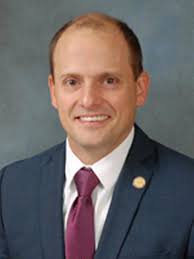We still have time, though not much of it. If we as the State of Florida are finally going to get our act together and take real action on climate change, we need to act now.
At the Capitol in Tallahassee during the 60-day legislative session this year and last year, I wore large black rain boots emblazoned with the hashtag #ActOnClimateFL. Because I wear them, my colleagues and I talk every day about climate change and sea-level rise.
I am optimistic. The ingredients are there for real action soon.

Two Senate committees unanimously approved a bill I filed (SB 78) that would have required sea-level rise planning for taxpayer-funded construction projects in coastal areas. It did not pass, but I am encouraged by the broad bipartisan coalition we built. We are already at work for next year.
Gov. Ron DeSantis has named a Chief Science Officer, created the position of Chief Resilience Officer and reappointed a Secretary to the Department of Environmental Protection who “gets it” on climate.
We ought to be at full speed in a race against time and it feels like we’re just now starting to crawl. Nonetheless, this year’s progress is welcome.
What has taken so long? Though a few still deny the science, the biggest impediment to action is a deer-in-the-headlights condition: a paralysis caused by the scale and complexity of the problem.
We are slowly overcoming inaction because climate change and sea-level rise are no longer seen as just environmental challenges. They’re now also economic issues. Threats to jobs, mortgages, home values and investment have added immediacy and urgency where it wasn’t before. Credit markets and insurance companies are watching — we need to act soon to send economic signals to the world that Florida is taking these challenges seriously.
Miami-Dade County, the City of Miami and the City of Miami Beach launched their “Resilient 305” collaboration this week. They’re taking action on short- and long-term solutions and backing it up with funding. Miami Beach Mayor Dan Gelber called sea-level rise “surmountable.”
To back up such optimism, Gelber highlighted FEMA’s upgrade to Miami Beach’s flood rating this year, responding to planning and strategic investments made by the city to curb chronic flooding. Residents save on insurance and the city’s investment pays off.
So an environmental issue has become economic. It will also become a social issue, one with moral implications.
Change can be gradual. If we let it, however, change can also be chaotic. Crises that suddenly hit hard can be weather events, like hurricanes, but can also be financial events affecting local economies or home values.
The challenges ahead don’t end there. The latest U.S. Climate Assessment talks not just about floods and fires but wide-ranging threats to our food supply and a increase in illness and disease.
Those most affected by chaotic change are those who are least mobile, like seniors; or those communities and residents with few economic resources. Every day we don’t act we potentially make the pain worse for the most vulnerable.
All of this, however, only tackles step one: the EFFECTS of climate change. Step two means tackling its CAUSES. We may not be able to stop this speeding train, but we must do our part to slow it down.
Florida should be a leader on solar and other renewable energy. We are very far from it. Bold action on climate would reduce our emission of carbon dioxide into the atmosphere. So far, however, legislation to create renewable energy standards in Florida has languished.
My wife and I are raising two young sons. We want them to be able to live in our beloved Miami when they grow up. If we act now, I’m confident they’ll have that chance.
José Javier Rodríguez is a State Senator from District 37.
“The Invading Sea” is a collaboration of four South Florida media organizations — the South Florida Sun Sentinel, Miami Herald, Palm Beach Post and WLRN Public Media.


